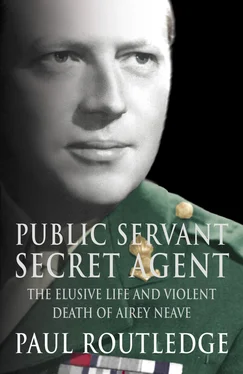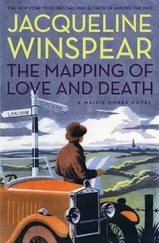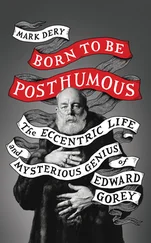Dawn found the pair by the railway line which ran from Podgorz and Sluzewo, checking their compass to keep on a southeasterly direction to Warsaw, 150 miles away. They tramped on, bypassing Alexandrov and keeping to the fields to avoid German patrols. The early morning rain turned heavier, soaking and dispiriting the pair. They took refuge in a Polish farmhouse, where two young women watched wordlessly as they stripped naked and dried their clothes before the open fire. Resuming their march through sodden fields, they came upon evidence of Hitler’s Blitzkrieg on Poland in the autumn of 1939: Polish army helmets perched atop rough white crosses, burned-out farmhouses and barns, a shattered chapel with a crucifix broken in two. At nightfall, lost in a labyrinth of cart tracks, they sought shelter in another Polish farmhouse. A farmworker listened to them ask the way to Wlocawek (German Leslau), smiled and answered in English. The farmer there was ‘Tscherman [German] … very bad’. He suddenly appeared, shouting at the farmworker as if he were a dog, and the escapers fled. Deeper in the countryside, they came on another farm, where they were welcomed by the old man of the house and his two daughters. Neave stood awkwardly in the living room, pointing to his soaked and torn trousers. The old man spoke to one of his daughters and she left the room, returning with a pair of peasant’s corduroy trousers. They had no fly buttons and Neave cut off the buttons from his painter’s trousers for the girl to sew on, which she did, blushing and giggling. No money changed hands. Neave was conscious of the dangers the family ran in helping them. Another Pole came to warn that the German farmer was looking for them, and fear was evident in the way they talked. ‘A great feeling of guilt ran through me as I witnessed their terror,’ Neave recalled. ‘Was it to destroy these simple lives that I had escaped?’ 5 They could sleep in the barn, said the old man, but they must leave at dawn.
After a fitful night in the hay, the pair resumed their forced march to Wlocawek. Neave shaved by a stream and cooled his blistered feet. He reflected how oddly domestic it seemed, using Elastoplast to dress his sores. By mid-afternoon on their second day of freedom, they reached Wlocawek. Resting by the River Vistula, they were spotted by a German officer, who went away without speaking. Once in the town, they were overwhelmed by the ubiquity of Nazi flags and emblems, even above the doors of workmen’s cottages, until they realised the date: it was 20 April, Hitler’s birthday. In Wlocawek Neave witnessed an act of thoughtless Nazi brutality: a young SS thug assaulted a Jew wearing the Star of David on his back for not saluting his troop, sending the man flying into the gutter and his hat across the road. No one dared pick it up. That evening, they again sought refuge at a farm but realised they were among the enemy. The family was German, the boy of the family sporting a swastika belt bearing the legend Gott Mit Uns. They escaped into the cover of a pine forest and huddled together for warmth, worn out by their ordeal.
By the third morning of their escape, Neave was in a state of physical exhaustion. The regime of a poor diet and lack of proper exercise during almost a year of captivity was taking its toll. He felt that he had ‘lost his feet’, which had deteriorated to ‘raw stumps’ dragging along the ground. Their pace slowed. Hauling themselves painfully along rough tracks, they halted from time to time to sleep and regain their strength. Apart from a lonely woodman, they met no one. They crossed the Vistula by a rail bridge taking the line south from Plock, and in the evening approached the village of Gombin. It was empty and unwelcoming. They stumbled on the road to Warsaw, looking for shelter but finding none. The pair lay down in a ploughed field, endeavouring to sleep but waking regularly to keep their circulation going. Their reserves of chocolate had gone, forcing them to eat a revolting mixture of condensed milk and tinned sardines. ‘I thought the night would never end,’ recollected Neave.
When it did, they set off without breakfasting but with as much vigour as they could muster to reach their goal, Warsaw, by nightfall. Trudging across interminable ploughed farmland, they reached the agricultural town of Itow, thirty miles from the capital. Beyond Itow they would be in the frontier zone of the General-Government of Poland, the remnant of Polish territory left between the Russians and western Poland handed over to German nationals. They had no papers to enter this zone and only a haphazard idea of where the actual frontier lay. Three miles further on from Itow, they came to another run-down village, and asked a woman where the border was. Nervously, she replied ‘It is here’, and fled. Pain and weariness conspired to rob them of vigilance as they walked through the village, towards the frontier post alongside a guardhouse, which was apparently unmanned. They strode through the gate, straight into the arms of two watching German sentries sitting by the roadside, rifles by their sides. They did not have the strength to run away. The soldiers, remembered by Neave as big, stupid and fresh-faced, asked them for their papers. Forbes, the German speaker, admitted that they had none. But everyone had to have papers to cross the General-Government, the soldiers insisted. Surely these men knew that. ‘We were only going to visit our mother, who is sick in Sochaczew,’ said Forbes. ‘This is my brother.’ They were led into the guardhouse where a German official, a whip hanging on the wall behind him, bawled ‘Attention, Polish swine!’
He then instructed the sentries to take Forbes outside while he interrogated the exhausted Neave, who mumbled his prepared explanation that he was a Volksdeutsch from Bromberg. Desperate with fatigue, his brain refused to function. He forgot his limited stock of German and spoke haltingly. The official laughed and brandished the whip in his face. Neave stuck to his story, hoping to give time for Forbes to make a run for it. ‘I could not. I no longer cared that I was caught again or even if this brutal official were to flog me to death,’ he admitted. 6 After a few minutes, Neave gave up the unequal struggle and brought from under his shirt the metal disc identifying him as Prisoner of War No. 1198. His enthusiastic but ill-prepared bid for freedom was over. Had his grasp of German been better, or his exhaustion not so complete, he might have bluffed his way through. It was not to be.
Pandemonium broke out. Forbes was brought back into the guardhouse, and another official woke from his sleep and joined in the general clamour. Neave’s co-escaper tried manfully to cope with their accusations. ‘You are not Englishmen, but Polish spies,’ they cried. ‘This is a matter for the Gestapo.’ Neave’s accuser gabbled down the telephone, his dog-tired prisoners barely understanding what was being said. They were then marched back to Itow by a soldier, who, conscious of their condition, did not hustle them. Neave noticed Forbes discreetly tearing up his map of Graudenz aerodrome, which might suggest they were indeed spies, and panicked. Where had he put the other copy? From the police station at Itow they were driven back under guard to Plock, which turned out to be a down-at-heel town swarming with SS. Their lorry dropped them outside a modern block and Neave’s heart missed a beat. By the door, he saw a board carrying the legend ‘GESTAPO’. Their worst fears had been realised.
The two men were taken to a small room where an SS officer and an interrogator in plain clothes asked them more questions and ordered them to empty their pockets. Pitiful remnants of their bid for freedom – bits of chocolate and bread, scraps of paper, a match box disguising a compass – spilled on to the table. The plain-clothes interrogator sorted through these items disdainfully and then seized on a small, folded piece of paper from Neave’s wallet. It was the map of Graudenz aerodrome. ‘So, my friends, you are from the Secret Service!’ he said triumphantly. Unbeknownst to Neave, Graudenz was a bomber station, from which the Luftwaffe would attack the Soviet Union at the outset of Operation Barbarossa only two months later.
Читать дальше












